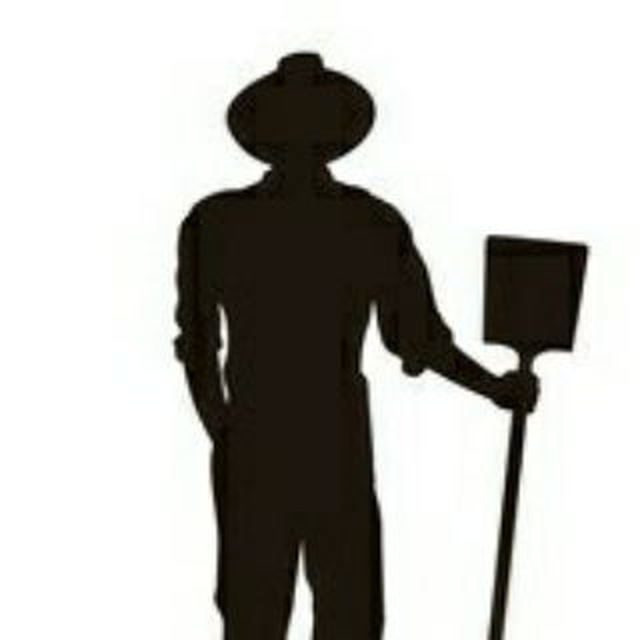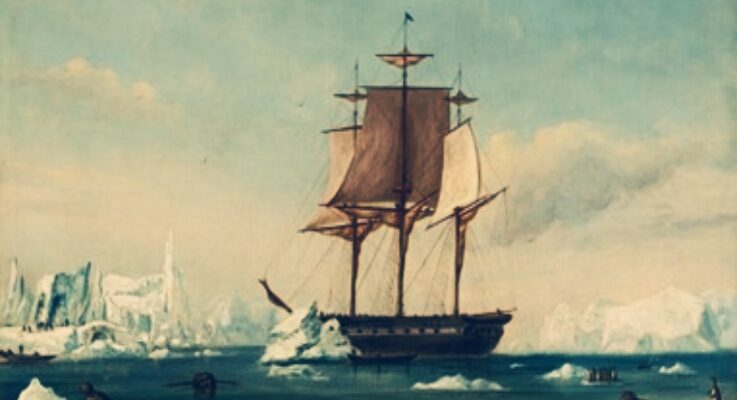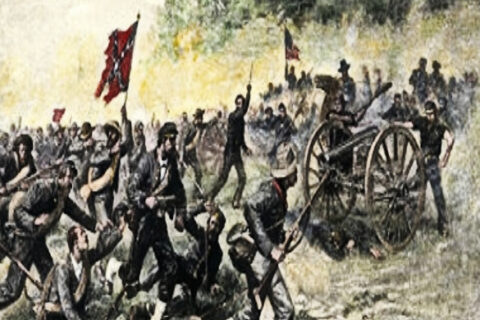(Note to readers: Below is Chapter VIII of my book, The Life and Times of Matthew Fontaine Maury, Pathfinder of the Seas. Nine other chapters of the book have been published here at Identity Dixie to date, and may be found at my contributor pages, here.)
The year was 1861, and the new President elect was en route to Washington to take command of the ship of State. Many questions and concerns surrounded the new President’s inauguration, and the country was in a general uproar. In the twenty odd years that had passed from the time Lieutenant Maury was appointed Superintendent of the Depot of Charts and Instruments under the Navy Dept., divisions between the Northern states and their Southern counterparts only grew more intense with the passing of each year.
There was talk in the South of secession or of leaving the Union if Mr. Lincoln should be elected, and in the Northern states the general sentiment was that such talk was tantamount to treason, an act of aggression and a prelude to civil war. In the South, the general attitude was quite different. The “Union,” in the South’s conception, had been, at its inception, a voluntary association of sovereign states who, through the instrument of the written Constitution, had only agreed to grant to the newly-formed national government certain prescribed powers, leaving the residue to the individual States or to the People to exercise as they should see fit within their own jurisdictions. In the north there was talk of a “higher law” – higher, they said, than the Constitution, and higher even than the Bible – that should, and would, govern the whole nation. By force of arms, if necessary.
To the Southern states, that was tantamount to treason, an act of aggression against the South and the prelude to civil war. So, tensions were running high, and there seemed to be no way to ameliorate the crisis and avert civil war.
It was aboard the U.S.S. Falmouth, serving in the capacity of ship’s Sailing Master that young Maury would conceive the idea for charting the winds and currents at sea. This was the voyage for which he had sought the best sailing directions to Rio de Janeiro in 1831, only to find precious little to satisfy the want. Being master of the ship meant that Matt had his own cabin onboard, and it would be within the confines of those quarters in his off-duty time that he would discover that his panacea for ennui could be put to practical use for making improvements in the Navy.
During this voyage, Matt would observe and study the curious phenomena of the low barometer off Cape Horn. And on this subject he would later write a scientific paper which would appear in the American Journal of Science, a Washington publication. In addition, it was aboard this same vessel that he would begin work organizing for the presses his ideas for a book on practical navigation. This was considered a bold step for an officer of Matt’s rank, but he quietly proceeded with his plan nevertheless, believing that the merit of the principles contained within the book, once published and widely disseminated, would vindicate his apparent presumptuousness when all was said and done.
Matt wrote from Philadelphia to his brother, Dick, on Oct. 29th, 1835, concerning the book’s imminent publication:
Dear Dick,
Yours of the 10th inst. is before me; for which I thank you most heartily. But first I must tell you how comes it that I am here.
I left Fredericksburg ten days ago, and am here for the purpose of hurrying my book through the press. The publishers were to let me have the proof-sheets in Fredericksburg, but they came to me so slowly that I resolved to come on here and use every exertion to bring the book out before Congress meets. Without wishing to excite your expectations, I will let you into the secret of my plans, which I wish you to preserve as a secret, in order that, if I should not succeed in what I undertake, my friends and family may not feel the effects of disappointment.
You must bear in mind that this is the first nautical work of science that has ever come from the pen of a naval officer; and upon its merits I intend to base a claim for promotion. Such a case has no precedent. Therefore you must look upon it as an experiment in which I may, or I may not, be successful. If I succeed, I shall be put over the heads of many who are now above me. You see in this another motive for secrecy, for many of those over whose heads it is likely I would be placed would, if they knew I contemplated such a thing, use every exertion to prevent it.
I shall ask to be made a lieutenant of ten years’ rank. If this is done (of which I am by no means sanguine), besides the advantage of making me old in rank, it will entitle me (I think) to back pay, as though I had been a lieutenant these ten years; and this back pay will amount to some $4,000 or $5,000. I shall be promoted next March at any rate, and my object is to get the book out and present my claim before that time, which, by being presented before I receive any promotion, will be doubly strong. Hence the haste to have the book out. …
Publication of the book would not result in his promotion to the rank of lieutenant of ten years’ rank as Matt had hoped, but the book was out nevertheless, and although it contained principles on practical navigation that contradicted some of the assumptions of Bowditch, it would, some few years later, become the standard for practical navigation in the U.S. Navy.
Nathaniel Bowditch was born March 26, 1773, in Salem, Massachusetts. At the age of twelve, Nat became indentured for nine years as a bookkeeping apprentice for a ship chandler in Boston. During which time he began to show great aptitude in mathematics and foreign languages. Recognizing his capacity for book learning, his master gave him access to his library containing an extensive collection of scientific books written in English and other languages.
Nat would sail aboard merchant vessels on numerous occasions during his late adolescent and early adult years. On these voyages he became intensely interested in the principles of practical navigation at sea, and would, as most other seamen did at the time, use and consult John Hamilton Moore’s The New Practical Navigator as his textbook. But Moore’s book was known to contain a number of errors, and when Nat began to study it for himself, he would discover that it in fact contained thousands more errors yet undiscovered. He was subsequently asked by the American publisher of Moore’s book to correct and revise the third edition on his fifth voyage. But Nat found the task so difficult and the work so extensive as to be impracticable, and, at length, determined to quit the project altogether, and to engage the much simpler task of writing his own book on practical navigation.
This work he began and saw to its completion, strictly adhering to the principle he’d set for himself to “put down in the book nothing I cannot teach the crew.” And it is said that on that voyage, the entire crew of twelve, including the ship’s cook, “became competent to take and calculate lunar observations, and to plot the correct position of the ship” at any given point on its voyage. Bowditch’s book would later be published in 1802 under the title The New American Practical Navigator, and would soon replace Moore’s book as the shipping industry standard for the western hemisphere. A distinction it would retain for the next one hundred and fifty years.
No one in a position to recommend his promotion in 1836 understood the value of Matt’s newly published contribution to practical navigation. Indeed, most believed Matt’s book to be of little to no practical value at all. After all, they already had Bowditch, and who was this young passed “Middy” to believe himself to have somehow improved upon the long-established principles of Bowditch?
This inability to understand him had long been a festering source of frustration for Matt; it was something he had encountered repeatedly during his time in the Navy. Indeed, out of a class of 53 midshipmen brought before the Navy’s Board of Examination some years before, Matt would place a disappointing 27th among them in his examination. What appeared a mediocre performance in his examination was, however, due to no failure on Matt’s part.
The examination as it was then given was verbal, not written: a board member would begin by asking the midshipman a question about navigation; the examinee would in turn give his verbal answer; another member would ask a different question, and so on until the examination was complete.
Matt understood the principles of practical navigation as well as any member on the examination board, and better than most. His expression or recitation of the principles, however, deviated from the exercise of rote memorization virtually all other midshipmen seeking advancement answered before the board. This being the case, the examiners mistook his unusual recitations as indication of a failure on his part to fully grasp the concepts. In truth, Matt’s deep and thorough understanding of the principles far exceeded that of his examiners, and that was the biggest source of their misunderstanding of the content of his answers.
Meanwhile, as a newly married young man beginning his own family, Matt wished to provide for his family’s needs and comforts to the best of his ability while continuing the pursuit of his chosen vocation in the Navy if at all possible. His secret plan for advancement based on the merit of his book was thusly an attempt on his part to provide for their comfort and safety while also finishing what he had started in the Navy. His failure to establish himself a lieutenant of ten years rank would force Matt to re-think and reassess his plans. Might it be better for the family if he were to resign from the Navy and seek employment in another profession? This dilemma would haunt Matt for a time and a season, but the happy answer would come in due course.
Early in August of 1842, Lieutenant Maury would write to his cousin, Ann Maury, in New York that he had “come from home a month ago” to begin work in his new position, and that “so far the new duties are admirable.” The new duties to which he alludes in the letter were the duties entailed as Superintendent of the Navy’s Depot of Charts and Instruments at Washington.
The Depot of Charts and Instruments was first established as a naval office some twelve years before in 1830, just six years after Maury entered his naval service as a midshipman in 1824. The function of the Depot was to keep an inventory of navigational instruments and nautical charts to be issued to naval vessels for their voyages upon request. As such, the depot would also oversee repair and calibration of the Navy’s inventory of navigation instruments such as sextants, chronometers, compasses and the like.
But insofar as its intended function for supplying nautical charts to outbound vessels was concerned, it would soon be discovered that the depot could not supply a broad enough inventory of charts for all outbound ships containing the latest data along their routes unless it began to publish its own charts containing its own collected data along different and sundry routes. To this end, the Depot sponsored an expedition in 1837 led by Captain Charles Wilkes that would lead to the publication of four additional charts to add to its small inventory. Notwithstanding the benefit of the addition of the new charts, this method of expanding the depot’s inventory of charts containing data for previously uncharted parts of the oceans was exceedingly slow and inefficient. This was due to the simple fact that a single expedition to the purpose can only collect data for its precise route at the exact time of year it was taken. For a single vessel, or even a group of ten vessels, to collect the data sought after for all parts of the oceans at all seasons of the year would take thousands, perhaps even tens of thousands of years.
A more efficient and practicable system for collecting data from all parts of the ocean at all times of the year must therefore be devised and carried out. But how? Would it be possible for the United States Navy to send out hundreds, or even thousands of expeditions similar to that of Wilkes expedition to various parts of the oceans at all times and all seasons of the year? After all, the oceans are vast and almost boundless expanses extending for thousands and tens of thousands of miles in any one direction from any given point upon them. Such an endeavor would simply be impossible to carry out; it is utterly impracticable, and seemed as utterly hopeless. That is, until Lieutenant Maury, with his active and original mind, took command of the Depot.






